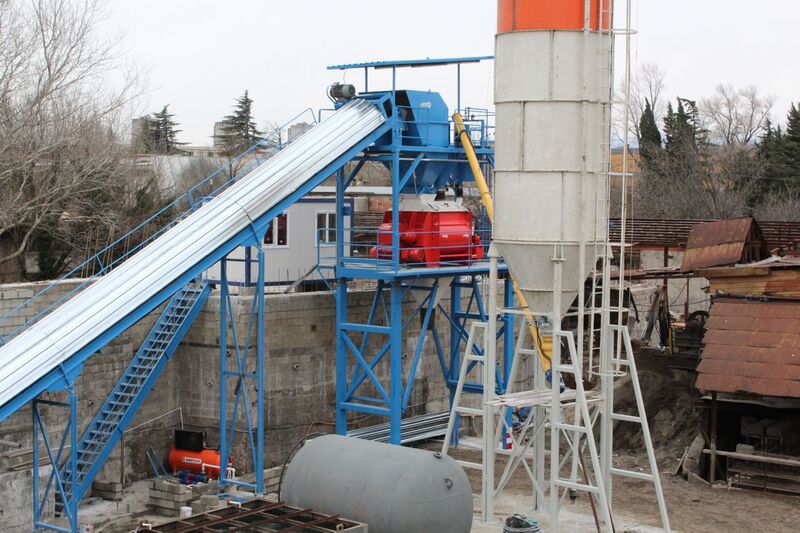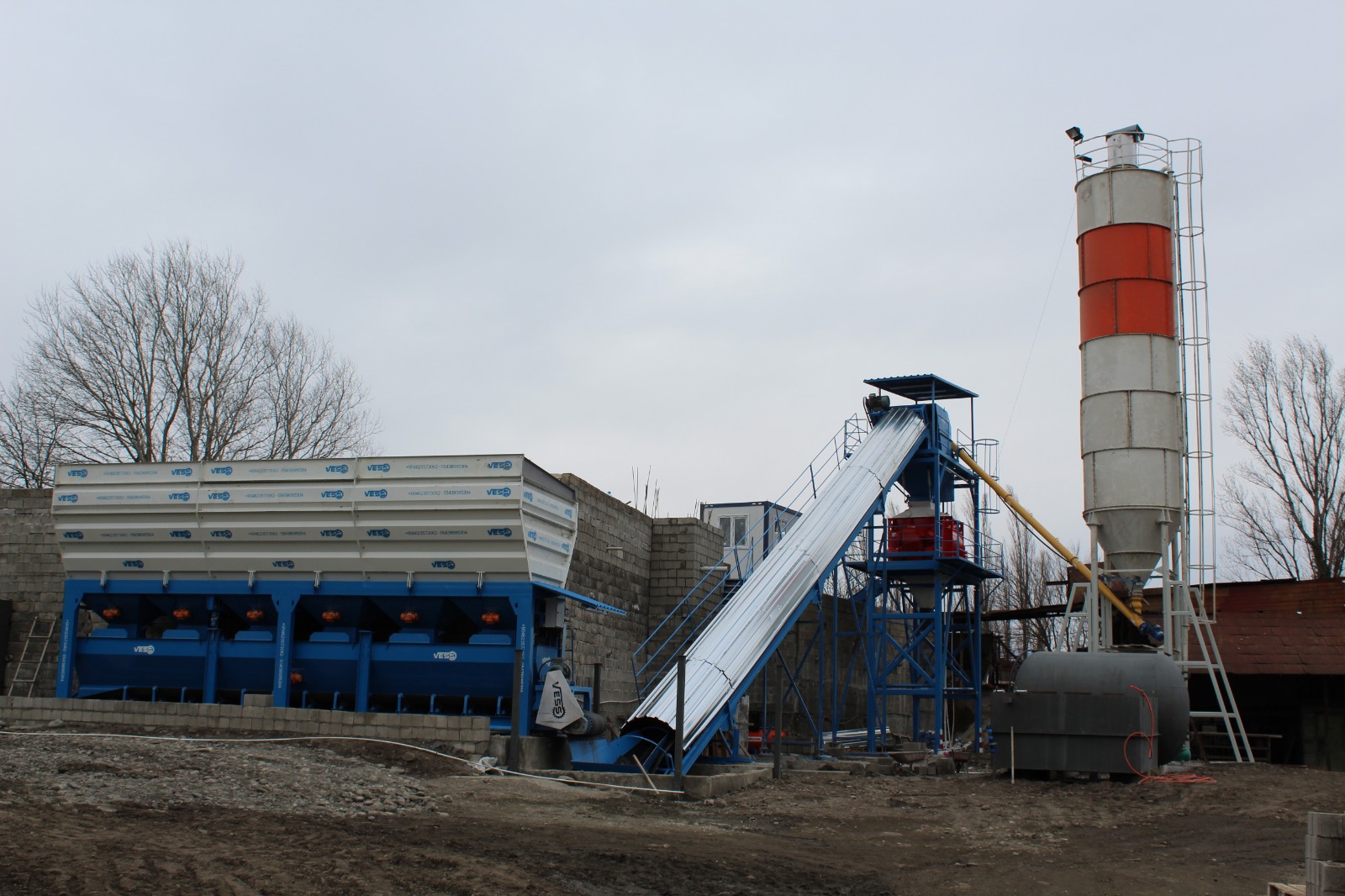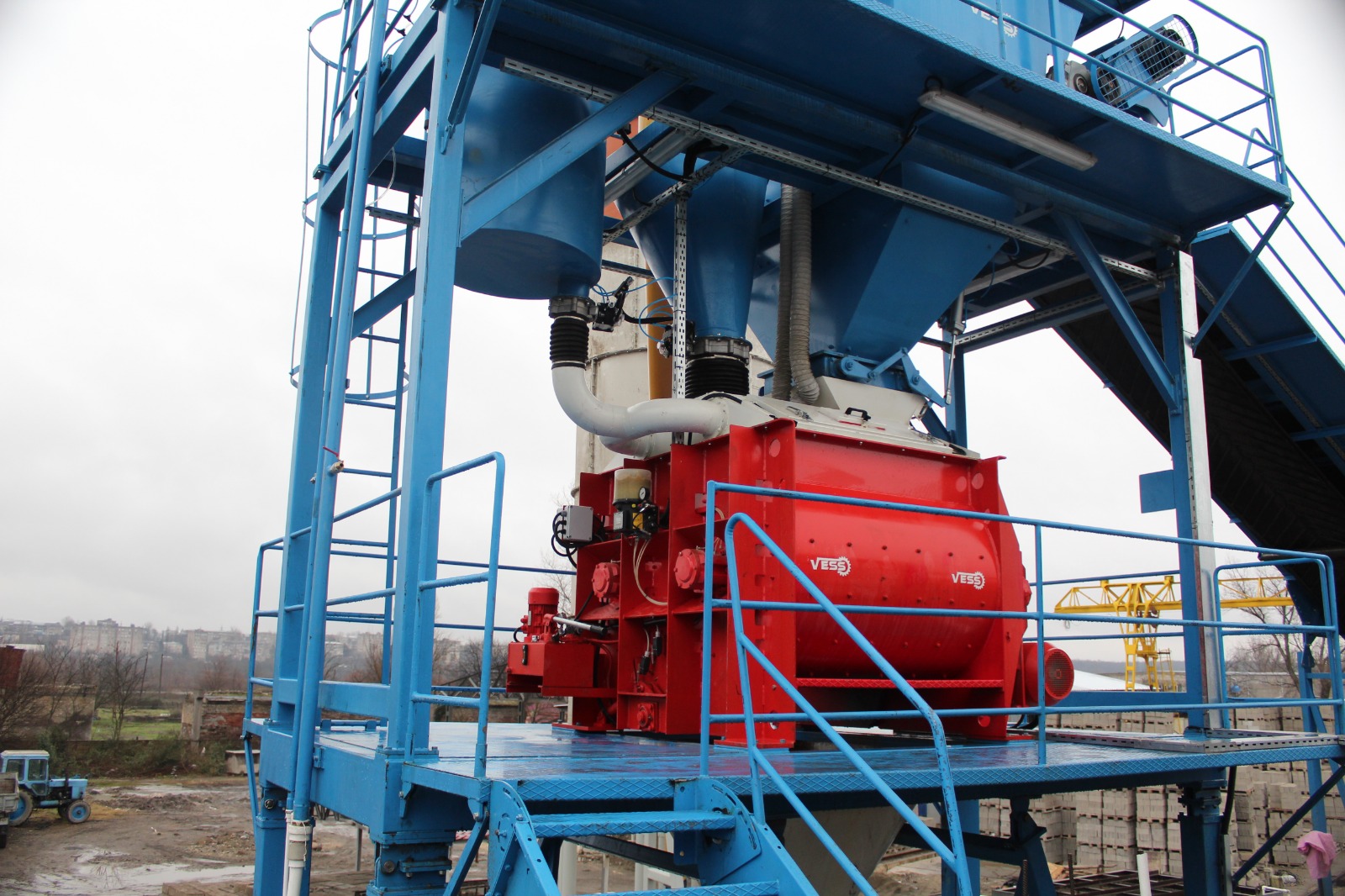A concrete mixing plant is also known as a concrete batching plant is a plant that mixes several ingredients and aggregates to form the ready mixed concrete which is used widely in construction.
First, let’s define what concrete and cement are. Cement and concrete can be used interchangeably but they are different things. Cement is an ingredient in forming concrete and concrete is a mixture of different ingredients including cement.

Concrete produced by batching plants is an important construction material used extensively in buildings, dams, roads, and bridges. It’s the best choice for residential and commercial projects. You may ask why and here is the answer:
- The strength of concrete increases over time
- Concrete can hold up against different weather conditions
- It is budget-friendly, easy to repair, and easy to maintain
- Concrete is fire resistant
- Concrete is not sensitive to moisture
Back in time, concrete was made manually but nowadays for big projects concrete batching plants provide the ready concrete.
Ingredients used in concrete:
- Powdered Portland cement
- Water
- Aggregates
- Reinforcements
- Chemical and mineral admixtures
To mix these ingredients there are standard ratios that should be considered when mixing them in the concrete batching plant.

Generally, there are two types of concrete plants:
1. Ready-Mix Concrete Batching Plant
All the ingredients required to form the concrete are combined except water. Water is added when the transmixer delivers the mixture to the site. By this method, concrete will be fresh by the time it is being used. Transmixer is a truck that has a drum behind it, the combination is poured to this drum and the drum rotates at different speeds.

While the transmixer delivers the combination, the speed of the drum should be set on low or medium to mix the combination thoroughly before adding water. Mixing the combination is also possible in the construction site. If you want to mix it in the site you should mix it for five minutes before adding water.
2. Central-Mix Concrete Batching Plant
This type of concrete plant mixes all the ingredients including water and forms the ready mixed concrete before pouring it into the drum of the transmixer. The transmixer only needs to agitate the concrete while delivering it to the construction site to keep the concrete fresh.

Which Batching Plant Is The Best For You?
It depends on your preference and the distance of the batching plant from your job site. Ready-mix concrete plants are perfect when the batching plant is far away from the job site. In this way, you can make sure to have fresh concrete on your site. On the other hand, if there is a batching plant close to your site the central-mix concrete plant is the best choice. These concrete batching plants produce more high-quality concrete as well because the amount of water for the mixture is added automatically.
There are different capacities of batching plants based on your needs. The standard sizes of the batching plants are mentioned below:
Concrete Batching Plant Equipment:
- Aggregate hopper and weighing system:
batching plant works automatically so an aggregate hopper is needed. This hopper has different compartments based on the number of ingredients used in the site. It can be 3 to 6 divisions with an unloading piston under each part. This allows the weighing system to automatically order the unloading pistons. There is a weighing system under each unloader that weighs the aggregate. When the process is controlled by the weighing system the same specified ratio is guaranteed and the quality remains the same.

- Conveyor belt:
The conveyor belt delivers the aggregates from the weighing system to the mixer. It is powered by an electric motor coupled to a gearbox. The conveyor belt’s bond should be sturdy enough to carry heavy aggregates. Sometimes a cleaning brush is located under the conveyor belt to clean the belt and to extend its life.

- Mixer:
Depending on your concrete batching plant production capacity there are different mixers available for your site. The smallest mixer has a 0.5 m3 mixing capacity and the biggest mixer has a 3 m3 mixing capacity.
There are two types of mixers for batching plants:
1. Planetary mixer
2. Twin-shaft mixer
Usually, a twin shaft mixer is used for this purpose because it is stronger and it can handle bigger capacities. The twin shaft mixer is powered by two electric motors coupled to their gearboxes.

The planetary mixer, on the other hand, has one shaft in the middle and mixes the aggregates inside the mixer.

The metal sheets are designed as replaceable. This guarantees long-term use of the mixer used in high-quality batching plants.
The Mixer is placed about 5 meters above the ground. The transmixer parks right under the mixer and the mixer pours the ready-mix concrete to the drum of the transmixer.
High-quality mixers have a shock absorber system to prevent the mixing blades from braking while mixing the aggregate. Sometimes stones are stuck between the body of the mixer and the blades of the mixer. The shock absorber has springs to move the blades a bit so the stone can pass from the blade.

- Silo
Depending on the capacity of the concrete batching plant different sizes of silos are used. The silo can be 30tons, 50 tons, and 80 tons. For higher production capacities you need to add to the number of silos as well. For example, for a 120 m3/hour capacity batching plant, you will need 4 silos with a capacity of 80 tons.
The cement needed for the mixer is added automatically to the mixer by a device called the cement feeding screw.
Air compressor:
An air compressor is needed for the plant to provide compressed air for actuators and pneumatic pistons of the plant. The capacity of the air compressor should be 500-liter to 1000-liter and the working pressure should be 8 bar.
batching plant prices:
The price of a concrete batching plant depends on the quality of the plant you are buying and the country that manufactures the plant.
The table below shows the prices of the batching plant:
| Concrete Batching Plant Price List | |||
|---|---|---|---|
| Plant Capacity | Mixer Type | Installation | Price |
| 30 m³/hour | planetary or twin-shaft | included | 70.000 € |
| 45 m³/hour | planetary or twin-shaft | included | 85.000 € |
| 60 m³/hour | planetary or twin-shaft | included | 120.000 € |
| 100 m³/hour | twin-shaft | included | 165.000 € |
| 120 m³/hour | twin-shaft | included | 198.000 € |
Consider in mind that these prices are for a complete plant including all the machinery required for your plant. You can contact us and ask for a proforma invoice to see the exact details.
we also produce another type of concrete batching plant called compact model, this machine works as a concrete batching plant and a hollow block machine as well. I will describe this machine in another article but I am adding a video of the machine as an introduction.
If you only need a hollow block machine and not a batching plant you can see our hollow block machine price list as well.
What To Consider When Buying A Concrete Batching Plant
One of the most important factors to consider is the quality of the machinery. It doesn’t matter how much your budget is, the important thing is you should find a premium-quality machine for your plant. Some countries provide premium-quality machines at expensive prices, some countries provide the same machines at lower prices because the labor cost is lower compared to other countries.
But in some countries the price is low but the quality is low as well. High-quality machines may look a little bit expensive in the beginning but the quality far overweighs the price. You can rely on your machine when it is a premium-quality machine. It needs less maintenance it can work 24 hours a day and lots of problems like faults with electrical and mechanical parts that may occur with the main system won’t happen when the quality of the machine is high.
The other factor is your capacity, you should consider developing your business in the future and buying a suitable machine for your future demands as well. If you are living in a developing country and the construction business is developing every day you might buy a bigger capacity batching plant than your current needs. It saves a lot of money for you in the future. Otherwise, you should sell your old machinery and buy a new one. This will cost you much more than buying bigger machinery in the first place.
Another factor is the automation level, make sure you buy an automatic weighing system for your plant otherwise you can’t provide the same quality over time and you will lose your customer.













